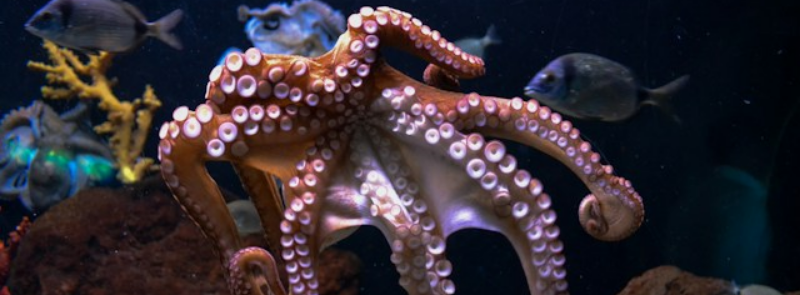
When It Occurs
Every October 8th
Timeline
Days Passed (868)
# Hashtags
#WorldOctopusDay #MarineConservation
Bring together your friends and family to commemorate World Octopus Day on October 8th! This unique day was established to acknowledge the myriad talents of the extraordinary underwater creature, the octopus. Being one of the oldest animals on Earth, the octopus has roamed our oceans for millions of years, evolving remarkable intelligence. From their adept camouflage among coral reefs to their ability to fit through tiny crevices, use tools, and communicate through color signals, there's much to learn from these fascinating beings. Let's take a moment to express appreciation for these amazing creatures on World Octopus Day.
History and Background
- Origin: World Octopus Day began as an informal celebration among octopus enthusiasts and marine conservationists to highlight the fascinating attributes of these cephalopods.
- Popularization: It has gained popularity over the years through social media, educational institutions, and aquariums promoting awareness about marine life.
Objectives and Significance
- Educational Awareness: Educate the public about octopus biology, behavior, and their role in marine ecosystems.
- Conservation: Raise awareness about threats facing octopus populations, such as habitat loss, pollution, and overfishing.
- Promote Responsible Practices: Advocate for sustainable fishing practices and conservation efforts to protect octopus species worldwide.
- Celebrate Nature: Appreciate the diversity and beauty of marine life, particularly octopuses, and their contributions to ocean biodiversity.
Themes and Focus Areas
- Octopus Biology: Focus on the anatomy, physiology, and adaptations of octopuses, including their intelligence and camouflage abilities.
- Ecological Role: Highlight the ecological role of octopuses as predators and prey in marine food webs and ecosystems.
- Conservation Challenges: Address conservation challenges facing octopus species and marine habitats globally.
- Public Engagement: Engage the public through educational programs, exhibits, and interactive activities to promote marine conservation and appreciation for octopuses.
Activities and Celebrations
- Aquarium Exhibits: Organize special exhibits and educational sessions at aquariums and marine centers featuring octopuses and their habitats.
- Public Events: Host public events, workshops, and lectures on octopus biology, conservation, and marine stewardship.
- Social Media Campaigns: Launch social media campaigns using hashtags like #WorldOctopusDay to share facts, photos, and conservation tips about octopuses.
- Classroom Activities: Engage students in schools and universities with educational activities, art projects, and discussions about octopuses and marine conservation.
How to Participate
- Learn and Explore: Learn about octopus species, their habitats, and behaviors through books, documentaries, and online resources.
- Visit Aquariums: Visit aquariums and marine centers that feature octopus exhibits and participate in guided tours or educational programs.
- Support Conservation: Support organizations and initiatives working to protect marine habitats and promote sustainable fishing practices.
- Spread Awareness: Share information about octopuses and conservation efforts with friends, family, and on social media platforms.
Global Participation
- International Reach: Celebrated globally by marine enthusiasts, conservationists, educators, and the public interested in marine biodiversity and conservation.
- Research and Education: Collaborates with researchers, educators, and marine biologists to advance knowledge about octopuses and promote conservation efforts.
- Community Engagement: Engages local communities in coastal regions and beyond to raise awareness and promote sustainable practices for marine conservation.
Resources and Support
- Marine Conservation Organizations: Provide resources, educational materials, and volunteer opportunities for individuals interested in octopus conservation and marine stewardship.
- Scientific Research: Conducts research on octopus biology, behavior, and conservation to inform policy decisions and management strategies.
- Public Awareness Campaigns: Launch campaigns and initiatives to educate the public about marine biodiversity, threats, and conservation actions.
Notable Observations and Examples
- Octopus Research: Showcases scientific discoveries, studies, and fieldwork focused on octopus species and their habitats.
- Conservation Success Stories: Highlights successful conservation initiatives and collaborations that have benefited octopus populations and marine ecosystems.
- Community Outreach: Engages local communities, stakeholders, and policymakers in discussions and actions to protect octopus habitats and promote sustainable fisheries.
Key Messages
- Marine Conservation: Advocate for sustainable practices and policies that protect octopuses and marine biodiversity.
- Education and Awareness: Promote understanding and appreciation for octopuses and their vital role in marine ecosystems.
- Stewardship: Encourage responsible behavior and actions to safeguard marine habitats and support conservation efforts.
- Global Collaboration: Foster international cooperation and partnerships to address global challenges facing marine life and ecosystems.
World Octopus Day serves as a platform to celebrate the beauty and significance of octopuses in marine ecosystems while promoting conservation efforts to ensure their survival for future generations to enjoy and study.


